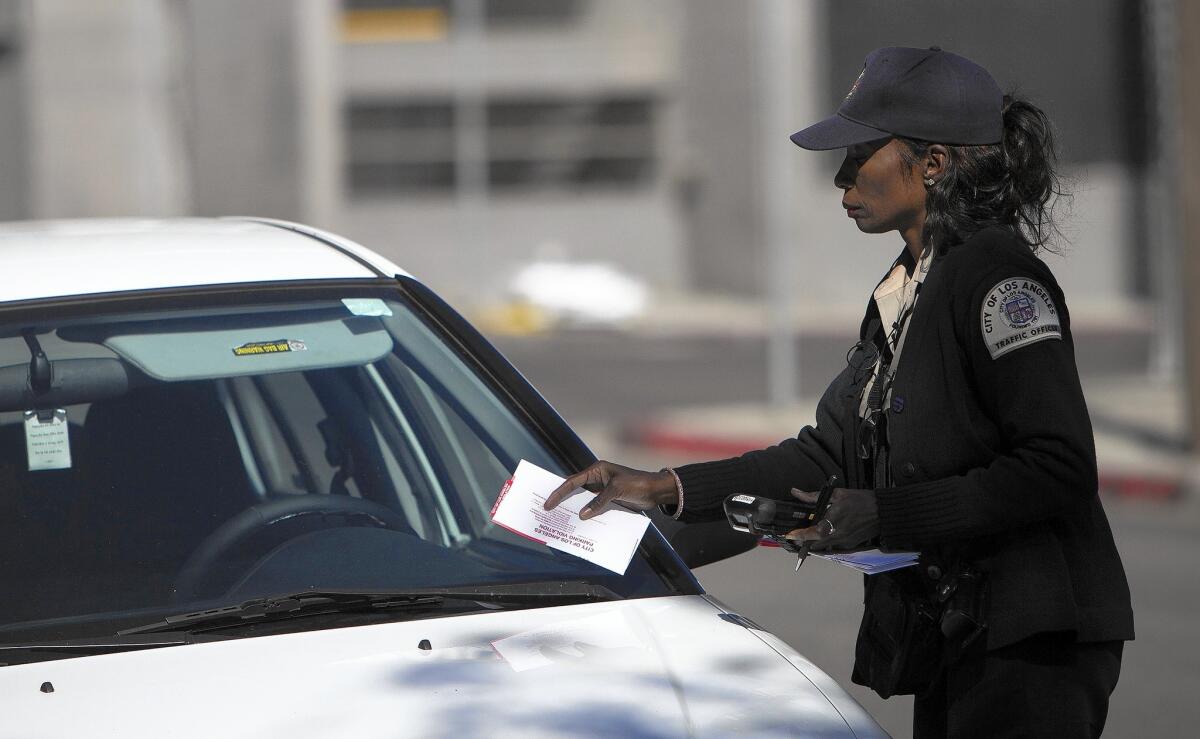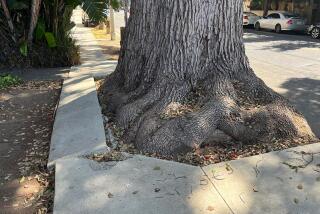Add street-sweeping tickets to dense neighborhoodsâ parking problems

Few things cause more anxiety for Los Angeles motorists than the sight of a parking enforcement officer writing tickets on street-sweeping day.
The cityâs Department of Transportation is known for its aggressiveness in enforcing the rules, often sending swarms of parking officers to hand out those $73 citations that cost drivers more than $50 million a year.
But a Times analysis of parking ticket data found that a few neighborhoods in the city get an outsized number of street-sweeping tickets.
The review found that the 10 most ticketed neighborhoods accounted for nearly a third of 662,000 street-sweeping citations issued in 2012. They included Hollywood, Koreatown and East Hollywood â all bustling areas with multi-unit apartments and a major lack of street parking. The denser a neighborhoodâs population, the more likely it was to rack up tickets, the analysis found.
In fact, the city provides street sweeping to less than half the city, leaving large swaths of the suburban San Fernando Valley without cleaning, or parking regulations.
Hollywood is the most-cited neighborhood, with more than 30,000 sweeping tickets. Nearly 90 blocks of the district racked up 100 or more street-cleaning tickets each. The most-cited two blocks in Hollywood were at Hawthorn and North Sycamore avenues, with 1,500 tickets collectively.
On an early November day, four parking enforcement officers circled Hawthorn and Sycamore avenues in their signature white hybrids, handing out at least 10 tickets in the first 45 minutes after sweeping hours began.
Travis Smith lived in an apartment at the corner of those two streets for seven years and said sometimes he had to move his car more than half a mile away just to find an available spot during street-cleaning hours. He got plenty of $73 street-sweeping tickets too.
âYou get used to it,â Smith said. âIf you want to live here, thatâs just what you have to put up with.â
The city makes no apologies, saying street sweeping is essential to keep the district clean and livable.
âThe public is paying for it, and they deserve the service,â said Kevin James, president of the Board of Public Works. âBut if cars are obstructing what taxpayers are paying for, then the obstructor is having to pay the fine.â
Critics contend that itâs unfair to target neighborhoods with so little available parking, and that some residents simply have no place to move their cars to.
âThere is a sense that if it was really about keeping streets clean, they would be more evenly distributed,â said Steven Vincent, co-director of the Los Angeles Parking Freedom Initiative, a group working with the mayorâs office to reform parking enforcement.
But public works officials said dense areas typically are the ones that most need cleaning. Also, any posted routes are in place because residents in those areas first requested street-sweeping service.
Because of staffing shortages during the last five years, the Department of Public Works is cleaning 96,000 fewer curb miles, or 28% less than in the past, James said.
Public works has shifted its resources to give top priority to restricted street-sweeping routes where drivers must move their cars every week or face tickets. James said the city is cleaning 95% of those routes, which are typically in residential areas.
Thatâs compared with just 15% of the unrestricted routes, which tend to be on such thoroughfares as Vermont Avenue or Wilshire Boulevard. Those routes used to be swept once a month but are now cleaned just twice a year, data provided to The Times show.
James said routes are chosen based on need, not on generating revenue.
âIf we donât have restricted routes, weâll never get a street sweeper through, and weâll never get this neighborhood clean. Look, I want to do all of it, but I donât have the resources to do all of it,â he said.
::
Enforcement problems have left some drivers with the feeling that the parking situation in L.A. is unfair. Poor coordination among city agencies adds to the chances that a driver will receive a street-cleaning ticket.
Residents have long complained that parking officers write up street-cleaning violations even when the sweepers donât show. Street services officials say that when breakdowns or other problems ground the street sweepers, parking enforcement officers are told to stand down.
Vincent, with the parking reform group, said itâs one of the most common complaints.
âIt seems as though there are a lot of areas where street sweeping is fairly infrequent, even though itâs posted to happen every week,â he said.
Last year, the Bureau of Street Services launched a website to let residents know where parking officers would not ticket because of such problems, but local media have found examples of parking officers writing citations on streets where cars were not supposed to be ticketed. Mayor Eric Garcetti has promised refunds to anyone who received such a ticket, and city officials said they have implemented new policies to try to eliminate the problem.
Lapses in street cleaning occur âfor a number of unclear reasons,â according to an internal report from the city administrative officer that was obtained by The Times this month. Even when street sweepers donât sweep posted routes, DOT parking officers write tickets, which âdampens the relationship and perception of our priorities as a city,â the report concluded.
James acknowledged past breakdowns and said his department was doing a better job of informing DOT of route changes.
âTaxpayers are paying for the street to be swept, so if they donât get the service, they should not get the ticket,â he said. âOn the fairness side of the equation, the city wasnât doing a very good job, and thatâs what we have worked to improve.â
City transportation spokesman Bruce Gillman said parking officers enforce parking rules but are not responsible for ensuring the streets are swept.
âI understand that itâs annoying if the street cleaner breaks down or whatever,â Gillman said. âBut what do they want us to do? Follow the street sweeper around?â
James said he would like to equip street-cleaning trucks with GPS tracking, which would relay real-time information to parking officers so they donât ticket on routes that have already been swept and on those that are not scheduled, James said. That technology would cost roughly $250,000, he said.
âItâs common sense, and itâs business-friendly,â James said.
Brian Kim, Greta Olesen and Times staff writer Ryan Menezes contributed to this report.
More to Read
Sign up for Essential California
The most important California stories and recommendations in your inbox every morning.
You may occasionally receive promotional content from the Los Angeles Times.











